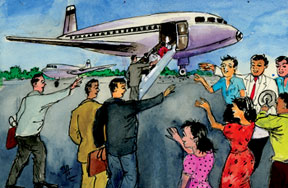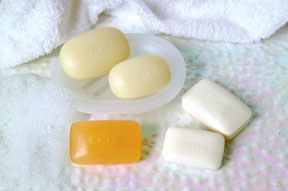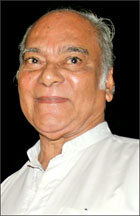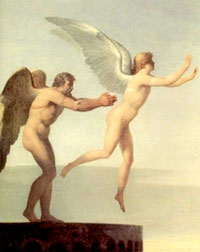|
Healthwatch |
Compiled and Coordinated by Edward
Arambewala |
In the medical profession:
Making brain drain a brain gain
|

Dr. Dennis Aloysius
|
 Dr. Dennis Aloysius (former President OPA) in an interview with the
Daily News health page on brain drain in the medical profession echoed
the views of the SLMA, mirrored in an article on the subject in one of
its past news sheets (SLMA news of August 2005) where Dr. Indika
Karunatilleke writing on the Doctors’ Brain Drain under the Editor’s
Notes page quotes the following from the British Medical Journal 331 &
332 where it says that the doctors brain drain in developing countries
like Sri Lanka could be overcome, and make it into a brain gain by
developing a ‘Brain gain’ network to attract the professionals back into
the country. Dr. Dennis Aloysius (former President OPA) in an interview with the
Daily News health page on brain drain in the medical profession echoed
the views of the SLMA, mirrored in an article on the subject in one of
its past news sheets (SLMA news of August 2005) where Dr. Indika
Karunatilleke writing on the Doctors’ Brain Drain under the Editor’s
Notes page quotes the following from the British Medical Journal 331 &
332 where it says that the doctors brain drain in developing countries
like Sri Lanka could be overcome, and make it into a brain gain by
developing a ‘Brain gain’ network to attract the professionals back into
the country.
Dr. Aloysius says although this remedial strategy has not received
the due attention it deserves from the responsible Authorities
concerned, it is worthwhile to drum it again from a widely read health
page like the HealthWatch in the Daily News.
Here’s the relevant article in the SLMA news bulletin.
To leave or not to leave
The migration of physicians from poor to rich countries is not a new
phenomenon. This migration which is commonly referred to as “brain
drain” has both positive and negative aspects. The benefits include
substantial financial remittances from expatriates and long term
professional networks and collaboration in health research.
However, the disadvantages such as loss of public educational
investment, reduced range of available services and chronic
understanding of health facilities outweigh the benefits. (Ahmad, 2005)
Can brain drain be stopped?
In the modern world there is no place for enforcing legislations that
forbid migration (Patel, 2003). A decision to do away with the overseas
component of the postgraduate training will be an equally negative
measure as the opportunity to work in a different country is an
enriching professional experience.
There are suggestions to introduce legislations to delay and
discourage the migration, such as increasing the value of the bond to be
signed before commencing overseas training. However, if these measures
are perceived as too punitive, it may be self-defeating by causing a
lack of co-operation from physicians.
There needs to be more sustainable solutions addressing the
fundamental causes.
What, are the possible causes of the brain drain?
One of the key reasons is professional dissatisfaction due to causes
such as poor working facilities and lack of intellectual stimulation.
Personal and financial reasons play a major role when a physician
contemplates the decision to leave. The deteriorating political and
financial situation of a country is another reason that might intensify
brain drain (Ahmad, 2005; Pang et al., 2002).
When considering the above factors, there should be strategies to
provide an attractive environment for returning doctors to work by
ensuring financial stability, providing adequate facilities and
opportunities for professional development (Pang et al, 2002, Patel,
2003).
The negative effects of the brain-drain can be reduced by developing
a brain gain network to attract the medical professionals back to the
country. The promotion of joint research and the use of medical
specialists in periodic return visits can harness the expertise of
expatriate physicians.
What is required is to develop and implement strategies to get the
maximum benefit out of disadvantegeous situation.
Interviewed and text by Edward Arambewala
Be wise in choosing your soap
by N. M. C. Niranjala Nanayakkara Science Teacher
Bloom International College, Italy
 Once you get a soap tablet you would probably have checked the
perfume impact, shape and colour of the tablet. But have you thought
about anything beyond that? Especially the quality of the soap. Once you get a soap tablet you would probably have checked the
perfume impact, shape and colour of the tablet. But have you thought
about anything beyond that? Especially the quality of the soap.
Scientifically we can define soap as a sodium or potassium salt of a
carboxylic acid.
Normally it uses coconut oil (CNO), Palm kernel (PK), Palm stearin
(Pos) or Tallow as the oil to produce soap. If you use only coconut oil
to produce a soap the soap will give you too much of lather and too high
weariness. Therefore to produce higher quality soap you need a blend of
oils. Chemically coconut oil and palm kernel oil are very close to each
other.
Although a soap which use coconut oil gives more soft lather than
Palm Kernal oil. The weariness can be reduced by adding Palm stearine.
Therefore we can say a blend of coconut oil, Palm Kernel and Palm
stearine will give you better quality soap.
In addition to oil and caustic soda, good quality soap contains
optical brighteners, chelating agents, perfume and colour.
The following quality parameters are checked to evaluate soap.
1) Rate of Wear (Weariness)
2) Cracking
3) Mush
4) Lather (Characteristics of lather and lather volume)
5) Feel in use (Grit and other feels)
6) After feelings
Rate of Wear (Weariness)
The dissolving nature of soap and the amount of soap dissolved for a
wash is considered in this quality parameter.
The oil blend contributes a lot for the weariness of the soap. If you
use an oil blend with a higher number of unsaturations it will give you
less weariness. Hence Oleic acid and stearic acid decrease the weariness
of soap while Tallow and Nut oil increase the weariness. When the TFM
(Total Fatty Matter) of soap is higher it will increase the weariness of
soap.
Other than the oil blend, the processing conditions, size and shape
of the tablet, the temperature of the water you use, the way you apply
the tablet and the way you store the soap will contribute a lot for the
rate of weariness.
As you know, when area/volume (a/v) is less the reaction rate is
higher. If your soap size is small it will lead to higher rate of
weariness. I have observed most of people in Sri Lanka especially in
rural areas cut their soap tablet into two before they use the tablet.
Although you think it will be more economical to you the result will
be vice versa. Because when you cut the soap you have make the size
smaller and it will lead to higher rate of weariness.
If you use your soap in a lower temperature of water without cutting
the tablet and store in an area of lower humidity with a higher
temperature you will be able to use your tablet longer than normal.
Cracking
Cracks on the soap tablet are considered in this quality parameter.
Poor processing conditions, Variation in fatty acids, Sodium ions
contributed from sodium chloride (salt) or sodium carbonate lead to
cracks. Not only that the manner of rubbing the soap between the hands,
the manner in which the soap was placed back on the tray after use, the
pressure you applied on the tablet will contribute a lot for cracking.
If you protect your soap tablet from over drying, store the soap
changing upside down (Once you store the tablet facing one side up store
the next time keeping the other side up), and quize the tablet once it
used, you will be able to protect your soap from cracking.
Mush
The paste of a soap and water formed when the soap is left in contact
with a little water as in a soap tray.
Higher amount of Tallow and nut oil increase mush while Oleic acid
and hardened tallow decrease the amount of mush.
When the weariness of tablet is higher the amount of mush formation
is lower. Other than the processing conditions, the area of soap in
contact with water (size and shape of the tablet), the amount of water
in the container, the temperature of the water and the humidity of the
environment affect the amount of mush.
If you can minimize the water content in the soap tray, minimize the
area of the soap tablet which contacts water, store in a room which
compared to less humidity and higher temperature, you will be able to
minimize the waste of soap which loss due to mush.
Lather (Characteristics of lather and lather volume)
Characteristics of lather mean the correct potion of small bubbles,
big bubbles and creaminess lather which gives more comfort to the
consumer.
Lather volume is the amount of lather which is measured in their
volume.
As I told you earlier, the oil blend affect the amount of lather
directly. The higher amount of Palm kernel and coconut oil and if the
blend ratio of Olealate: Laurate is 1:1, it leads to higher amount of
lather.
Higher amount of Tallow and higher amount of Palmate decrease the
amount of lather. As well as higher amount of electrolytes decrease the
lather.
Other than the oil blends the hardness of water you use directly
effect to the amount of lather.
If you use hard water the amount of lather is very low compared to
the pure (soft) water.
Not only that but also the way you generate the lather contributes a
lot for the amount of lather.
Feel in use (Grit and other feels)
This tells you how you feel the soap when you use it. The level of
grittiness, perfume type and impact, characteristics of lather and
volume of lather of the soap contribute a lot for feel in use.
Grittiness: Hard particles or lumps present in a soap measured by the
grittiness.
This shows you the processing condition of the soap as well as
foreign particles present. Grittiness of soap must be minimized. And
baby soap must not contain any kind of grit because it can damage your
baby’s skin.
As well as girls and ladies who concern their skin must be careful
when they choose soap.
After feelings
This tells you something like, how do you feel once you finish your
bath.
Amount of dirt removing ability, the perfume type and lingering
effect of the perfume, the freshness you get after the bath as well as
your mental condition can contribute lot to this.
Be wise when you choose your soap.
An Account of a Life with Cancer
|

Henry Jayasena
|
A DVD on famous Sri Lankan film and theatre actor, Henry Jayasena’s
experience with cancer, called “Mage Kathawa” which was done to aid and
encourage other patients and their caregivers, was formally handed over
to the National Cancer Institute, Maharagama.
The DVD is produced by Mithuruwela, the Cancer Support Network, a
registered non-profit organisation involved in bringing greater
awareness and understanding of cancer, its early detection, and
treatment to people living with cancer, and their caregivers.
Although the third largest cause of death in this country is cancer,
there is a serious dearth of information on this disease-particularly in
the national languages, Sinhala and Tamil.
A group of cancer survivors and friends have responded to this need
for information and support by forming Mithuruwela-the cancer support
network.
The network was launched in January 2005 in Colombo and aims to reach
across the country to all Sri Lankans-particularly the disadvantaged and
marginalized who are most in need of help.
Mithuruwela is a network of volunteers committed to providing a
better understanding of cancer causes, prevention, early detection,
treatment regimes and services, and other aspects like coping mechanisms
by sharing experiences and knowledge.
It aims to help patients and caregivers make informed decisions about
dealing with cancer so that they can look beyond the diagnosis and deal
positively with the treatment and its after effects.
The network is working with a multi-disciplinary group of health
professionals to set in motion a comprehensive plan of action.
Activities will be implemented in several phases: forming key
activity groups, producing and disseminating print and audio-visual
information material in all three national languages, creating a network
of trained ‘befrienders’, setting up a cancer hotline, and initiating
advocacy work on cancer.
From history
 Throughout the history of the mankind, the rulers tried to implement
policies to prevent or promote migration. More often than not the
measures to prevent migration by enforced legislation were not
successful. This fact is well illustrated by the story of Daedalus, the
most skilful craftsman in the world who worked for the Greek king Minos. Throughout the history of the mankind, the rulers tried to implement
policies to prevent or promote migration. More often than not the
measures to prevent migration by enforced legislation were not
successful. This fact is well illustrated by the story of Daedalus, the
most skilful craftsman in the world who worked for the Greek king Minos.
The king wanted to prevent Daedalus from leaving the country and
eventually the artist was shut up in a tower. The king kept strict watch
on all the ships and border posts to avert any attempts to escape.
“Minos may control the land and sea,” said Daedalus, “but not the
regions of the air. I will try that way.”
Daedalus set to work to fabricate wings for himself and his young son
Icarus, using feathers and wax. Finally the work was completed and the
artist, waving his wings, found himself air borne.
He next equipped his son in the same manner and both the father and
son flew away.
History also provides evidence about rulers who actively attempted to
recruit intellectual from foreign countries.
The great Egyptian king, Ptolemy II, invited and persuade most
learned men in all fields to come to Alexandria.
He managed to integrate them into the Alexandrian society and
provided these scholars with a comfortable life, allowing them to study
write, collate manuscripts, research and lecture in their respective
disciplines.
Letter Box Medical Advice
S. Fernando from Anderson Flats, Colombo 5
Writes: on Problem of Puffiness.
I must in the first instance thank Dr. D. P. Atukorala very much for
the valuable free advice he gives people through the newspapers, his
articles are highly appreciated by all who read them, in fact many
people purchase the Daily News mainly to read his articles.
I am 81 years of age, I am a Diabetic but it is under control, I
avoid everything that contains sugar and take a Dianil Tablet every
morning and regularly check my Blood Sugar level at the Asiri Hospital -
I am vegetarian except that I regularly eat sprats and eats white of
boiled eggs, this is not regular.
I am fond of eating Ash plantains in various cooked forms, may I
please know whether this is good or bad?
Quite often my stomach gets puffed up when I excert myself - but this
subsides when I keep a TNT tablet under my tongue. Have I got to consult
a cardiologist, please advise me.
Dr. D. P. Atukorale’s reply to Mr. S. Fernando from Colombo 5.
Angina pectoris presenting as puffiness of stomach
Thank you for your interesting letter. “The puffiness of the stomach”
related to exertion and which subsides on taking sublingual G.T.N. (TNT)
tablets in your case, I am sure is angina.
It is advisable for you to see your family physician (GP) early and I
am quite sure that your GP will arrange for an ECG, Fasting Blood Sugar
(as you are a diabetic) and a lipid profile.
Even if the ECG is normal, your GP may refer you to a cardiologist
who will arrange for an exercise ECG (stress test) as in majority of
angina patients, the resting ECG is normal.
If the exercise ECG is positive for ischaemia, your cardiologist will
arrange for medical treatment in view of your old age (81 years) and
your diabetic condition.
|

